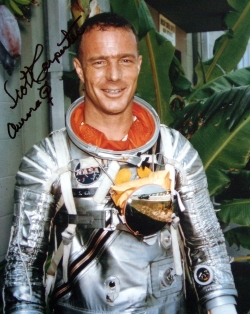Scott Carpenter died this week in 2013:
We grew up watching these astronauts on school, usually in school in my case. We always had a teacher that would allow us to watch the capsule takeoff. It was so exciting.
Carpenter's death means that John Glenn is the lone survivor of that great group of men.
RIP Scott Carpenter!
Tags: Scott Carpenter astronaut To share or post to your site, click on "Post Link". Please mention / link to the My View by Silvio Canto, Jr. Thanks!
Carpenter was selected as one of the original seven Mercury Astronauts on April 9, 1959. He underwent intensive training with the National Aeronautics and Space Administration (NASA), specializing in communication and navigation. He served as backup pilot for John Glenn during the preparation for America’s first manned orbital space flight in February 1962.Carpenter flew the second American manned orbital flight on May 24, 1962. He piloted his Aurora 7 spacecraft through three revolutions of the Earth, reaching a maximum altitude of 164 miles. The spacecraft landed in the Atlantic Ocean about 1000 miles southeast of Cape Canaveral after 4 hours and 54 minutes of flight time.On leave of absence from NASA, Carpenter participated in the Navy’s Man-in-the-Sea Project as an Aquanaut in the SEALAB II program off the coast of La Jolla, California, in the summer of 1965. During the 45-day experiment, Carpenter spent 30 days living and working on the ocean floor. He was team leader for two of the three 10-man teams of Navy and civilian divers who conducted deep-sea diving activities in a seafloor habitat at a depth of 205 feet.He returned to duties with NASA as Executive Assistant to the Director of the Manned Spaceflight Center and was active in the design of the Apollo Lunar Landing Module and in underwater Extravehicular Activity (EVA) crew training.In 1967, he returned to the Navy’s Deep Submergence Systems Project (DSSP) as Director of Aquanaut Operations during the SEALAB III experiment. (The DSSP office was responsible for directing the Navy’s Saturation Diving Program, which included development of deep-ocean search, rescue, salvage, ocean engineering and Man-in-the-Sea capabilities.)Upon retirement from the Navy in 1969, after 25 years of service, Carpenter founded and was Chief Executive Officer of Sear Sciences, Inc., a venture capital corporation active in developing programs aimed at enhanced utilization of ocean resources and improved health of the planet. In pursuit of these and other objectives, he worked closely with the French oceanographer J.Y. Cousteau and members of his Calypso team. Carpenter dove in most of the world’s oceans, including the Arctic under ice.
We grew up watching these astronauts on school, usually in school in my case. We always had a teacher that would allow us to watch the capsule takeoff. It was so exciting.
Carpenter's death means that John Glenn is the lone survivor of that great group of men.
RIP Scott Carpenter!
Tags: Scott Carpenter astronaut To share or post to your site, click on "Post Link". Please mention / link to the My View by Silvio Canto, Jr. Thanks!
